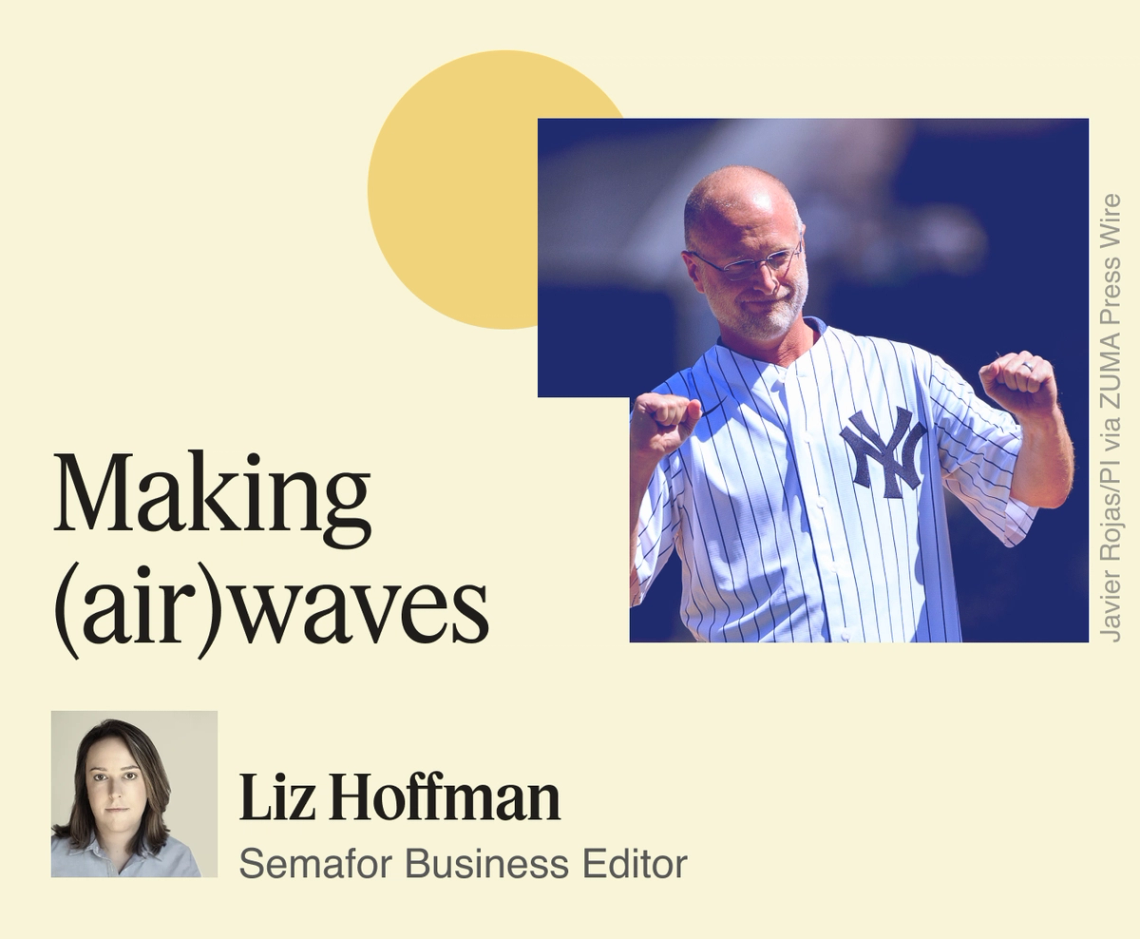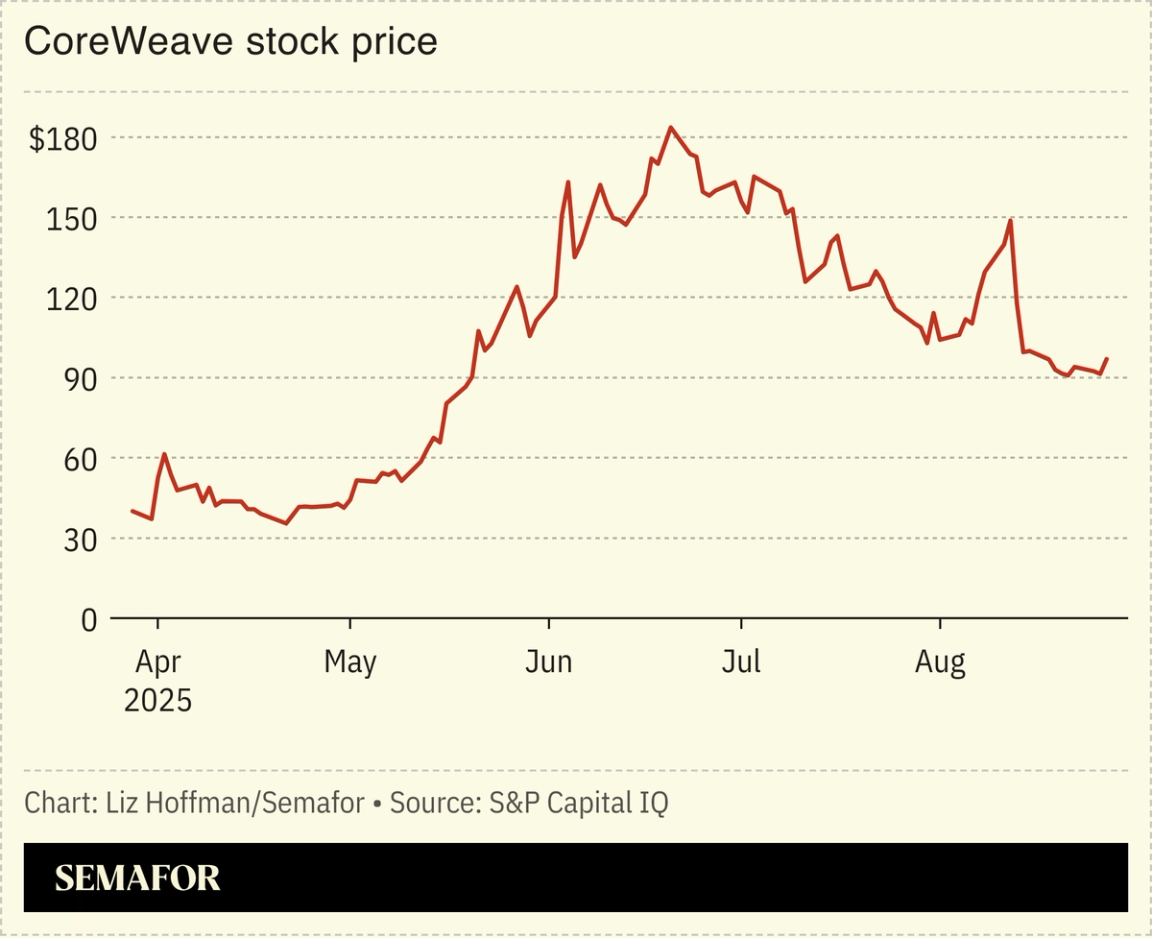| | In today’s edition, a look at the surprising breakout star of Trump’s regulatory apparatus. Plus, sp͏ ͏ ͏ ͏ ͏ ͏ |
| |  | Business |  |
| |
|
 Name a past head of the Federal Communications Commission. Bet you can’t. Brendan Carr is quickly on his way to being, if not a household name, then at least a boardroom name. This week alone, he spurred a giant spectrum-license deal by telling EchoStar’s Charlie Ergen to use his airwaves or lose them and waded into two big channel fights, Comcast vs. the Yankees’ broadcaster YES Network and Google vs. Fox. (“We love football too @brendancarrfcc!” YouTube’s corporate X account responded, promising it’s working to reach a deal that will avoid a fall NFL blackout.) Carr has launched formal reviews of nearly all the major broadcast networks — ABC, CBS, NBC, NPR, and PBS — though not Fox. He has used his regulatory cudgel to force Comcast, Verizon, and other companies to walk back their DEI policies. He investigated a radio station owned by Audacy for airing the location of immigration raids in San Francisco. Critics say he’s censoring free speech. He doesn’t see it that way, though has defended his actions less as neutral regulation than as a rebalancing of the Biden administration’s stance toward right-leaning media. He told Semafor’s Ben Smith earlier this year that few people paid attention to a decision by Biden’s PCC to release public comments on a bid to deny the license renewal of a local Fox News station, calling the move “the definition of media bias.” His prominence is surprising given that the FCC’s authority is strongest over the withering parts of media — broadcasters that use publicly owned airwaves — and doesn’t touch streaming. But the dance between new and old media gives him levers to pull. Carr has proven facile at navigating both, sitting for a color-commentator breakdown of his ceremonial first pitch at Yankee Stadium and latching onto Silicon Valley’s “time to build” narrative to tout his plan to replace America’s copper-wire grid with new technologies. Biden’s breakout star, Gina Raimondo, managed to turn the Commerce Department, the hall closet of government, into an expansive remit — and launch her own national political career in the process. As YouTube’s corporate X channel wrote in its bid to quickly placate Carr this week: Stay tuned. |
|
Who wins in a spectrum war? |
 Jonathan Newton/Pool via Reuters Jonathan Newton/Pool via ReutersThe airwaves war is heating up. AT&T’s deal to buy $23 billion worth of spectrum from Ergen’s EchoStar this week was a reminder that bandwidth is a limited commodity — owned by the public and licensed to private companies that are keen to deepen their own moats (in the case of legacy wireless giants) or crack in (in the case of Elon Musk). Semafor reported Tuesday that T-Mobile and Musk’s SpaceX had both bid for part or all of EchoStar’s spectrum, which is one of the largest underutilized tracts of bandwidth. We’re told T-Mobile’s ultimate owners, Deutsche Telekom, tapped the brakes, and it’s unclear whether SpaceX, which envisions a satellite-to-ground cellphone network through Starlink, is still interested in the chunk that AT&T didn’t want. What happens to Ergen’s airwaves cache will matter to consumers, says Peter Adderton, who co-founded Boost Mobile, which sold to Ergen in 2019 to form his planned competitor to the big three providers. That never happened, and in an interview with Semafor, he urged the FCC to consider competition when weighing approvals for AT&T’s purchase. “Everything that they do is to ensure that nobody else has a leg up on them,” Adderton told Semafor of the big carriers. Could other suitors emerge? Adderton sees Verizon as a beneficiary of the kind of spectrum that EchoStar is shopping around, while Amazon has its own fledgling satellite network — Kuiper — and could step into the fray. |
|
CoreWeave takes on haters |
 When a small bitcoin miner tried to take on big cloud providers in the data-center game, it found few takers. “This business doesn’t make sense,” was the message that Mike Intrator and Brian Venturo, co-founders of CoreWeave, say they got from venture capitalists back in 2019. “You’re not hardware. You’re not software. We can’t do it.” CoreWeave is now a $47 billion company — its March IPO richly rewarded the investors who did take a flyer, including Nvidia — and a major player in the AI race. But it still has its doubters. It’s become a proxy for concerns over AI hype, which sharpened this week when Nvidia reported strong sales but saw its shares slide anyway — a sign of how lofty investors’ expectations are for the sector and how easily they can be disappointed. New AI model releases, like OpenAI’s GPT-5, have shown only marginal improvements, and new studies cast doubt on the returns on corporate AI spending. CoreWeave also sits at the center of AI’s circular money machine, taking cash from Nvidia and others and giving it right back to those companies to buy hardware. Intrator’s biggest move as CEO, a $9 billion deal announced last month to acquire Core Scientific, is running into shareholder pushback. And famed short-seller Jim Chanos is questioning CoreWeave’s accounting. |
|
Trump’s policy is personnel |
 Jonathan Ernst/Reuters Jonathan Ernst/ReutersAmerica’s chief executive is on a firing spree. Recent days have brought a series of firings and pressured departures among agencies that have historically operated with a measure of independence from the White House. The Trump-appointed head of the Centers for Disease Control and Prevention is fighting her firing and accusing the administration of “weaponizing public health,” while at least three of her deputies stepped down over disagreements with Robert F. Kennedy Jr.’s agenda. Almost 200 people have left the Nuclear Regulatory Commission since Trump’s inauguration, the Financial Times reports, prompting fears of a “brain drain” just as nuclear is undergoing a renaissance, in part to fuel AI’s growing energy needs. Even smaller regulatory bodies aren’t immune. The White House fired a member of the national railroad regulator late Wednesday night, The Wall Street Journal reported — the same regulator that is weighing a mega-merger that executives are presenting as a pro-America, pro-industry deal. |
|
Political turmoil hits French finances |
 The French government is close to collapse for the second time this year, sparking investor worries over a potential intervention by the International Monetary Fund. Paris’ borrowing costs spiked as Prime Minister François Bayrou bet the house on a confidence vote, set for early September, over austerity plans to reduce government borrowing — an election he has little chance of winning. Bayrou has signalled a willingness to negotiate with party leaders from his coalition, to a point. The only non-negotiable, he said, is “to get out of the path of over-indebtedness,” he said in a television interview. The continent has never been a model for fiscal responsibility, but France (like the US) both carries high debt and runs big budget deficits, even with its economy growing modestly well over the past few years (also like the US). French business leaders, meanwhile, are already trying to head off any talk of tax increases.  |
|
An obit for global banking’s green initiative |
 Kylie Cooper/File Photo/Reuters Kylie Cooper/File Photo/ReutersWall Street’s climate coalition, an institutional husk that embodies the corporate world’s mostly performative and short-lived progressive lurch, is drawing its last breaths. The Net-Zero Banking Alliance will suspend its activities, the group said on Wednesday, pending a vote next month by its few remaining members. What started in 2021 at the height of green virtue-signaling quickly ran into trouble. Shareholders recoiled at the idea of banks putting ideology over profits, and politicians saw a multinational conspiracy of progressive scolds. Most of the big US members bailed this year, and European members were rumored to be next out the door. In a sense, the group’s collapse doesn’t change much, Semafor’s Tim McDonnell writes: Over the past decade, global banks have lent about $1.50 to fossil fuel companies and projects for every dollar they’ve lent to green energy, according to Bloomberg. (The largest lender, JPMorgan, did a bit better average at $1.29, according to its own numbers, reported for the first time in 2024.) Still, that ratio is slowly shifting, and there is plenty of money for banks to make in the energy transition. Coalitions like NZBA arguably did more harm than good by drawing political heat to genuinely profitable investments that simply happened to reduce emissions, and by giving reputational cover to those with no intention of participating in the climate transition. “I don’t see this as a pulling-back of actual work being done,” Cary Krosinsky, a sustainable finance lecturer at Yale University’s Center for Business and the Environment, told Semafor. “It’s just that there was way too much focus on vague concepts like net zero pledges that no one actually knows how to fulfill.” — Tim McDonnell |
|
 The next wave of global growth starts at The Next 3 Billion. Convening against the backdrop of the UN General Assembly, Semafor will host on-the-record conversations with Iván Duque, Former President, Colombia; Idris Elba, Award-winning Actor, Filmmaker, Musician, and Activist; Cristina Junqueira, Co-Founder & Chief Growth Officer, Nubank; Patrick Muyaya, Minister of Communications, Democratic Republic of the Congo; Peter Ndegwa, CEO, Safaricom; and more on the economic, social, and global impact generated by bringing the next three billion people online. September 24, 2025 | New York City | Delegate Application |
|
➚ BUY: Discounts. Bargain stores Five Below and Kohl’s both reported strong quarters. Five Below’s CEO says shoppers want “extreme value,” while Kohl’s has been making more of its goods coupon-eligible. ➘ SELL: Premiums. Michael Saylor’s public-company playbook — buy Bitcoin and watch his shares trade for more than the value of that crypto — has begun to hit speedbumps, Bloomberg reports. |
|
 Companies & Deals- Cleanup, cashout: TikTok will offer to buy back employees’ shares in a cap-table cleanup that is expected to value the company at more than $330 billion, Reuters reported. Like many tweenaged but still private companies, ByteDance has restive employees with valuable equity they can’t monetize. (Stripe and OpenAI have done the same.)
- Bumper-sticker watch: Tesla sales are in freefall in Europe, dragged down at least partly by Musk’s damaged reputation on the continent. Sales fell 40% in July, while Chinese rival BYD’s more than tripled.
- Vertical integration: Amazon will make Whole Foods’ corporate staff full-fledged Amazon employees eight years after buying the grocery chain, according to WSJ. The move could bring Whole Foods’ office workers onside as store employees
|
|
|